
Second-century AD Christian mural showing a communion ceremony led by a woman (left), from the Catacomb of Marcellinus and Peter in Rome.
Christians who happen to read my Roman-era novels, A Rooster for Asklepios and A Bull for Pluto, might be surprised or even chagrined to see how Christianity is portrayed in the two books. Christians do not appear very often since there were not many of them in Asia Minor at the time my stories take place (mid-first century AD), even after the evangelistic travels of the apostle Paul. When they do enter the story, they tend to be rather secretive about their faith and not always well-versed in its teachings. Outsiders, if they’ve heard of the group at all, voice mostly negative opinions of this odd new cult, especially if the conversation turns to the apostle Paul, who is typically disparaged as a trouble-maker. Positive images of Christians do appear now and then, but the dominant tone is negative.
It would be wrong, however, to conclude from these images that my books are somehow anti-Christian. I myself am a Christian, and I have great respect for those early pioneers across the Roman world who embraced the message about Jesus Christ and passed it on to others despite knowing that it could cost them their friends, their family, their income, and perhaps even their lives. In a world where polytheism was the norm, most people had a hard time comprehending why anyone would think that there was only one God, and the idea that this God had brought salvation to humanity through a crucified Jewish carpenter who had been raised from the dead sounded utterly ludicrous to them. To become a Christ-follower in Roman times meant linking yourself to a group that most people viewed as weird, subversive, and even cultish. Formal persecution did not begin until a century later, but Christianity certainly wasn’t a group that you wanted your kids to join.

Modern artist’s reconstruction of a Christian house-church meeting
One of my aims in writing these novels was to immerse my readers into the mundane realities of life in the Roman world, including its religious dimension. Religion plays a prominent role in my stories because that’s how things were back then. What we call “religion” pervaded all aspects of Greek and Roman life; it wasn’t something that people did only at certain times and places distinct from their ordinary affairs. It also wasn’t a private matter—it had strong social, economic and political dimensions. When Jews and Christians refused to worship the gods of their city or to honor the Emperor as divine, their refusal did not just mark them as peculiar; it led people to perceive them as a threat to the social order, since their “atheism” courted the anger of the gods.

Roman mosaic of prisoners being mauled by animals in an amphitheater, a fate that was later meted out to Christians whose teachings made them a threat to the social order
When therefore I portray Christians and Christianity in a negative light in my novels, I am not presenting my own views of the religion; I’m simply showing how Christians were viewed by outsiders at the time when my novels take place. It’s not just Christianity that I depict in this way—my stories paint both positive and negative images of all of the religions depicted in my books, including Greek, Roman, indigenous, and Jewish traditions. In fact, there’s a significant amount of anti-Judaism in the early chapters of the first book that will make Jewish readers cringe, but the depiction improves substantially as the story progresses.
As a social historian, one of my chief aims in crafting these stories was to help my readers to enter imaginatively into the lived experience of ordinary people in the Roman world, a world shaped by a very different set of beliefs, values, practices, and institutions than those we take for granted today. As the British novelist L. P. Hartley famously stated, “The past is a foreign country; they do things differently there.” If we truly want to understand the past, we must allow its inhabitants to think and act differently than we do even if those differences make us feel uncomfortable or offend us. If the reviews of my books paint an accurate picture of what readers experience when reading my novels, it seems that my efforts have largely succeeded.



